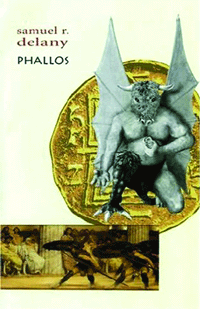Samuel Delany evokes pornographic enigma to illuminate the quest for erotic companionship
Enigmas fill the ancient world––a turtle bests Achilles in a foot race; Zeno’s arrow never reaches the target; the Sphinx dares the traveler to name what animal possesses a different number of legs during different parts of the day.
Samuel R. Delany’s latest novella, “Phallos,” is centered on this tradition of ancient enigmas. Not riddles, but enigmas. Riddles are meant to be solved. They differ from an enigma in that once a riddle’s answer is known there is nothing else, not even a riddle. An enigma, even after being explained, still exists because it only raises more questions.
Oedipus answered the Sphinx, “Man,” and we laugh at his cleverness. Yet, what sort of answer is that? Man? The word only prompts more questions. What is this mutable creature that changes through time while remaining the same individual? “Man” is the greatest of all puzzles, and will only ever prompt questions.
Delany’s novella tells the story of a book also titled “Phallos,” the autobiography of Neoptolomus, a Roman-born Egyptian from the island of Syracuse. Befriended by a wealthy merchant, the man sponsors Neo’s commission into the legions. Afterwards, this patron sends Neoptolomus to Egypt on a business trip where he is peripherally involved in the murder of Antinous, the Emperor Hadrian’s young lover, and the theft of a sacred item known as the phallos from the temple of the nameless god on the outskirts of Hermopolis.
For the rest of his life, Neoptolomus finds himself inadvertently wrapped into plots to retrieve this object. Those searching for it claim the phallos contains within its hollow core the mysteries of the universe written on papyrus; others believe it is filled with valuable gems; or that its very presence will reveal life’s secrets to the bearer. Like echoes, these plots repeat elements of previous ones, as well as contradict what we learned before about the phallos, further revealing or mystifying the object’s nature. Delany has always found metaphorical strength in mirrors, prisms, and faceted gems, things that reflect but yet also distort the world, permutating what we see into new and incisive, yet ephemeral, realities.
Plagued by the phallos and its entanglements, Neo only attains a measure of peace after he finds a true companion in his Nubian lover, Nivek.
Yet, all of this is merely a shell. Neoptolomus’ life story is the framing narrative for an ancient pornographic novel much along the lines of “The Satyricon.” Wherever Neoptolomus shows up in the diverse, polyglot Roman Empire, he finds male partners of all tastes, races, and proclivities, from a blond Celt to a Jewish soldier and even a temple dwarf. Neoptolomus devotes dozens of explicit chapters to these encounters.
However, the version we read of this “Phallos” is an abridgement by a modern reader posted on the Internet, and footnoted by his friends. Even more interesting is that this editor, one Randy Pedarson, has eliminated all direct quotes of the scabrous material that was, or possibly is, the point of “Phallos.” Those passages are summarized.
For example, here is the part, as described by Pedarson, where Neoptolomus is sold into slavery, physical and otherwise.
“… [H]is bandit paramour tells him gruffly: ‘You cost me 30 dinars––and a night’s sleep. Come here!’– and forces himself on our narrator.
I cannot quote it.
But is a sexual set piece.
Once their coupling (10 pages over two chapters, with half-a-dozen orgasms between them) is done. Neoptolomus’ owner, lover, and master turns out [to be] a committed son of the desert.”
We get a pornographic novel without the porn.
Throughout, Pedarson and his friends post in the footnotes comments regarding the authenticity of “Phallos.” Clues indicate it might not be an ancient text. There is evidence the book was at the center of several affairs and murders of 18th and 19th century art critics and their young boy lovers. But subtle anachronisms in the style and vocabulary of “Phallos” also mark it as a modern hoax. The text is as mysterious as its namesake, the phallos of the nameless god.
These enigmas shouldn’t put anyone off the book, thinking it’s another incomprehensibly post-modern work. “Phallos” is an easy, enjoyable read. Not because it is simple, but because it’s the work of a powerful writer. Delany effortlessly conveys the story’s profound philosophical wanderings as if engaged in a friendly dinner conversation. The prose is so lucid and evocative, planting the reader amid a sensual feast of the Roman Empire, that it’s hard to imagine the author didn’t actually live then.
And purpose of the phallos? Let’s just say Neoptolomus arrives at some understanding of himself through its existence. A link exists between the quest for the phallos––which no matter how hard Neoptolomus tries, is never retrieved, and yet which seems to be tantalizingly everywhere, determining his fate, driving him in certain directions, to certain actions with inescapable ends––and the excised pornographic text.
For what is more enigmatic than desire––the limitless, empty well that is never filled despite how much is put into it? Here Delany weaves the world’s great mystery amid Neoptolomus’ tale. The need and longing for companionship and sexual fulfillment which seem central to life, but which can never be understood, defined, or satisfied. It organizes the universe. It is as intangible as air.
gaycitynews.com



































